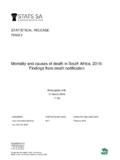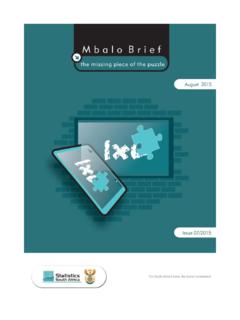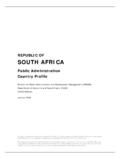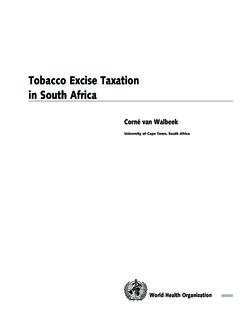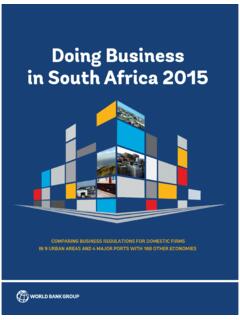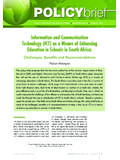Transcription of Internet Access in South Africa 2017 - World Wide Worx
1 Internet Access in South Africa 2017 Executive Summary SA Internet penetration to reach 40% in 2017 The South African Internet user population passed the 20-million mark for the first time last year, reaching 21-million, and is expected to grow to at least in 2017 . This is the main finding of of the Internet Access in South Africa 2017 study, conducted by World Wide Worx with the support of Dark Fibre Africa (DFA), the country s leading provider of wholesale fibre connectivity. Based on Stats SA s estimate that the South African population reached people in June 2016, this means that the country will reach the 40 per cent Internet penetration mark this year. Finally reaching the point where we can say every second adult South African is connected to the Internet is a major landmark, because Internet Access is becoming synonymous with economic Access , says Reshaad Sha, chief strategy officer of DFA.
2 For this reason, it is critical that the country prioritise the roll-out of infrastructure in underserved areas, especially outside the major metropolitan areas. The report reveals that the single most common use of the Internet among South African adults is Communication, reported by almost a third (31 per cent) of respondents, followed by Social Networking ( per cent) and Information ( per cent), both reported by almost a quarter of respondents. Only then comes Entertainment, at per cent. The report includes data from the Target Group Index (TGI) survey conducted by Ask Afrika, the largest market research organisation in Africa . World Wide Worx collaborates with Ask Afrika in the structuring of e-commerce, digital and electronics components of TGI, which comprises 15 000 interviews across a vast range of consumer topics and behaviours. The question on primary uses of the Internet was answered by a sample representing South African adults across all income and education levels.
3 While Communication is the single most important use, Email is reported by only per cent of respondents, indicating that it is becoming a less important element of the communications mix as social media becomes a default channel. Shopping and finance is cited by only per cent of respondents, confirming previous World Wide Worx research that showed e-commerce was still not a major element of South African retail in general. The findings emphasises the potential of the Internet to enhance lives when we have greater penetration across all segments and demographics, said Arthur Goldstuck, managing director of World Wide Worx. Over time, we will see higher proportions of people engaging in a wider range of activity, but the barriers to more active use will first have to come down. Affordability lies behind the digital divide The report reveals that the digital divide remains a stark reality in South Africa , despite more than half of all adults in the country now having Internet Access .
4 It s a divide that stretches across almost every imaginable sector of society, from geography and location to income and education, says Sha. The clearest divide is revealed in income disparity. Among adult South Africans earning more than R30 000 a month, Internet penetration is at per cent, on a par with overall penetration in many industrialised countries. However, penetration declines rapidly as income declines, falling to per cent for those earning between R14 000 and R18 000, 42 per cent for those earning between R3 000 and R6 000, and below 30 per cent for those earning below R2 500 a month. This is merely the most obvious divide, as one would expect Access to be associated with income levels, says Goldstuck. However, it highlights the extent to which lower income South Africans are frozen out of the Internet economy. The research shows that a third of adult Internet users rely on their cellphones as their primary means of Access .
5 For low-income users, Internet Access requires data costs to be taken off airtime, and those costs remain among the highest in the World . High-income individuals tend to buy data in large bundles, which brings the cost down dramatically, to the extent that their data costs compare with some of the lowest in the World . However, this obscures the high cost of data for the rest of the population. Education is also a barrier to Internet Access , with less than 20 per cent Access among all segments that have below Grade 7 education. Fewer than 40 per cent of those with less than a Grade 11 education have Internet Access , but it rises rapidly after that: with a maximum Grade 11 education, it goes up to per cent, Grade 12 goes to 55 per cent, and of those with a post-matric qualification, it reaches a high per cent. A digital divide also exists between major metros and non-metro areas, and between different cities and provinces.
6 The Western Cape has by far the highest Internet penetration of all provinces, at 75 per cent, followed distantly by Gauteng at 55%. This is believed to reflect the extensive local initiatives in towns like Stellenbosch and Somerset West to increase coverage, as well as an earlier start on provincial connectivity initiatives. There is one bright spot in the data: There is no longer a gender divide in Internet Access in South Africa , with only marginally more men than women having Access . A decade ago, there was still a strong bias towards male Access to the Internet . A country s capacity to connect its economy to the Internet and make these services available and accessible to its citizens and businesses is key to its success in the digital age, says Sha. Open Access fibre infrastructure deployment and availability plays a critical role in enabling service providers to deliver a range high speed of fixed and wireless Internet Access technologies and services to their consumer and business markets.
7 This contributes significantly towards the further development of the knowledge economy in South Africa . Contents The report includes detailed demographics of Internet users, in-depth analysis of major national and regional fibre projects in South Africa , undersea cables connecting sub-Saharan Africa , the role of mobile broadband in growing Access , and the significance of Access at academic institutions. Obtaining the report The full report is available for purchase at a cost of R18 000 (single site license) excluding VAT from World Wide Worx. To place an order, either request an order form to be mailed electronically, or send company name and address, VAT registration number, and name and e-mail address of person ordering and person who should be billed, to World Wide Worx by e-mail on or by fax on +27 11 782 7063. Please include a purchase order number where required.
8 Students who wish to obtain Access to the research should enquire though the libraries of acquisition departments of their universities or learning institutions. For more information contact: World Wide Worx: Arthur Goldstuck Mobile: 083 326 4345 Telephone: 011 782 7003 Email.

